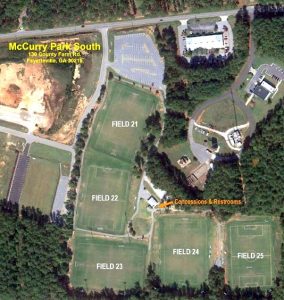A move by Fayette County Commissioner Steve Brown to have the future widening of McDonough Road linked with the county’s relocation of a water line along Ga. Highway 54 for the upcoming widening failed at the Feb. 23 meeting of the Fayette County Commission.
The motion to refuse to sign the 2015 “Standard Utility Agreement” pending additional information from DOT on how Hwy. 54 and the future McDonough Road widening project would impact traffic in Fayette failed on a 2-3 vote, with Brown and Commissioner Randy Ognio casting votes supporting the failed motion. DOT is currently set to begin the Hwy. 54 widening project.
There was no need to have a subsequent motion in favor of signing the agreement since the vote to sign it was made in 2015.
Having put the McDonough Road widening on the same agenda item as the standard utility agreement, Brown had his say on why he believed the Hwy. 54 widening and the McDonough Road widening were linked. Later in the meeting, Commissioner Charles Rousseau had his say on why the two are not.
Brown in a lengthy presentation on Feb. 23, and quoting from documents from a 2007 Atlanta Regional Commission report, outlined a Regional Strategic Transportation System that would establish a Metro Arterial Connector system around metro Atlanta.
“We’re talking about two different projects,” said County Administrator Steve Rapson at the conclusion of Brown’s remarks. Referencing the standard utility agreement from February 2015, Rapson said DOT set a price of $2.1 million to have one of its contractors move the county’s water line.
“We met with DOT and they said they would go with our contractor (at the county’s bid price) of $1.29 million,” Rapson said. “We’ve been directed to move out of the Hwy. 54 right-of-way. Hwy. 54 is vastly ahead of McDonough Road.”
“Two years ago we said we’d do it (on a 3-2 vote) but we wanted DOT to look at their numbers,” County Attorney Dennis Davenport said, noting that the county felt DOT’s estimate to move the water lines was too high. “If we tell DOT ‘no’ now, it’s more than just refusing to pay. It’s one and a half years of time DOT spent to work with us at our request. If you don’t sign the agreement, I fully expect that DOT will still move the water line out of its right-of-way and bill you the $2.1 million.”
Commissioner Chuck Oddo said the widening of the final portion of Hwy. 54 in Fayette County had been in DOT’s plans for more than 20 years.
Also commenting on the agreement, Ognio said he “kind of” agreed with Brown.
With his turn to speak, Commissioner Charles Rousseau set the tone for the eventual vote that would lead to Maxwell signing the standard utility agreement.
“This body (in 2015) agreed to enter into an agreement. This is procedurally inappropriate for us (today) to intertwine an agreement duly adopted by this body to try to cherry-pick another issue because we see an opening,” Rousseau said. “I’m disappointed that this conversation has elevated to this level. Do this first, them come back to the other issue.”
Rousseau continued his remarks with increasing emphasis.
“Don’t be misled, people, when we mix these (two items). None of us wants more traffic. That’s not the issue. The issue is we said (in 2015) we’d go forward with this thing, moving the utility line out of DOT’s right-of-way,” said Rousseau. “Let’s get off this. We mislead people when do this kind of thing. We ethically said we’d execute this document.”
Maxwell then weighed in, saying he did not know anything about the issue since he was not on the commission in 2015. Maxwell said that is why he wanted the issue brought to the board, a move that is within the purview of the board on any topic and one requested by Brown, so that “I can learn more about it.”
Rousseau responded, saying Maxwell could have learned about it by talking with county staff to bring him up to speed. Maxwell responded, saying he had spoken with Davenport about the topic.
It was Brown, along with Ognio, who opposed the standard utility agreement with DOT in 2015 that resulted in the county agreeing to move its water line situated in the state right-of-way so that the widening of Hwy. 54 to a four-lane roadway from McDonough Road to Tara Boulevard in Clayton County could occur.
The Feb. 23 decision to sign the agreement came as DOT is set to begin the widening project. Fayette County Public Works Director Phil Mallon in mid-February said the $50 million project will includes installing four lanes rather than the current two-lane roadway. The project will also include sidewalks and bike lanes and calls for the construction of a number of bridges.
Mallon said design work and right-of-way acquisition is complete and bids for the project are out.
Work is expected to begin later this year, Mallon said.
Pertaining to the McDonough Road project set for a yet to be determined date, Brown noted that the county public works department posed a number of questions to DOT in 2013 and have yet to receive answers. The widening project will turn McDonough Road into a state road.
For his part, Brown maintained that the McDonough Road project’s purpose is to increase vehicular capacity in Clayton and Fayette. He questioned the effect of having increased traffic through Fayetteville and north Fayette by having that roadway serve as the local leg and Metro Arterial Connector for the Regional Strategic Transportation System.
Maxwell asked Brown to work on a letter to DOT in an effort to get additional clarification on its intentions for the McDonough Road widening and its implications.













Leave a Comment
You must be logged in to post a comment.